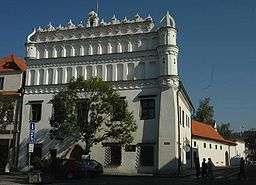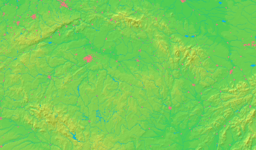Sušice
| Sušice | ||
| Town | ||
 Museum | ||
|
||
| Country | Czech Republic | |
|---|---|---|
| Region | Plzeň | |
| District | Klatovy | |
| Commune | Sušice | |
| Parts | 16
| |
| River | Otava | |
| Center | Náměstí Svobody | |
| - elevation | 472 m (1,549 ft) | |
| - coordinates | 49°13′52″N 13°31′13″E / 49.23111°N 13.52028°ECoordinates: 49°13′52″N 13°31′13″E / 49.23111°N 13.52028°E | |
| Area | 45.63 km2 (17.62 sq mi) | |
| Population | 11,257 (2015-01-01) | |
| Density | 247/km2 (640/sq mi) | |
| Founded | 1273 | |
| Mayor | Petr Mottl | |
| Timezone | CET (UTC+1) | |
| - summer (DST) | CEST (UTC+2) | |
| Postal code | 339 01 – 342 01 | |
  Location in the Czech Republic | ||
| Wikimedia Commons: Sušice | ||
| Statistics: statnisprava.cz | ||
| Website: www.sumavanet.cz/susice | ||
Sušice (Czech pronunciation: [ˈsuʃɪtsɛ]; German: Schüttenhofen) is a town in the Pilsen Region of the Czech Republic. It lies on the Otava River, some 60 km (37 mi) to the south of the regional capital of Pilsen.
Sušice is also the seat of the Municipality with Extended Competence and with Commissioned Local Authority. It is also the founding place of the Solo match factory.
History
Sušice originated most likely around the end of the 8th century as a settlement near the Otava River, a gold-mining area. In the 12th century was Sušice owned by the bavarian Counts of Bogen. It was re-connected to Bohemia by the Czech king Ottokar II of Bohemia in the 13th century and in 1273, it became a royal fortified town. During the Hussite Wars in the first half of the 15th century Sušice was a Hussite town. After the battle on Bila Hora (White Mountain; 1620 – the battle of the Czech aristocracy against the Habsburgs' monarchy) most of the properties were confiscated. The destruction of the town was finished by fire in 1707, when most of the sites burned down. Sušice is known for the production of safety matches which began in 1838 and has continued to the present. The Fürth family founded the local match factory.
The earliest known Jewish community settled in Sušice during the first half of the 17th century. The Jewish cemetery originated about 1626, with the last known Conservative or Progressive/Reform Jewish burial in 1874. A pogrom occurred in 1866. Jews moved to big towns in second half of 19th century. The 1930 Jewish population was 112.[1] Present town population is 5,000–25,000 with no Jews.
Here is how a regional newspaper from the neighboring town of Písek reported on a consecration of a new Jewish synagogue in 1859:
In the year 1659, there were just four Jewish families in Sušice, who built for themselves a small wooden synagogue. Fifty years later, that is to say two years after the great fire of Sušice, they built on the same site a new and larger synagogue more suited to their growing numbers. This synagogue was used for 150 years. During this period and particularly over the past decade, the number of Jews in Sušice increased greatly and the synagogue was no longer large enough. So the Jewish community bought three houses in Vodičkova Street (formerly known as Jewish Street) and decided to build a new synagogue there. The first stone was laid on 14 July 1857 in the presence of the Imperial and Royal[33] Chief of the Region, Mr. František Bastař, and the Mayor, František Firbas. It was decided to consecrate the synagogue in this year on the birthday of His Imperial Majesty. The new synagogue is of sound construction and one of the largest buildings in Sušice. We are able to say that it is one of the most beautiful Jewish synagogues in all of Bohemia. The synagogue is 12 fathoms (22 m; 72 ft) in length, 6 fathoms (11 m; 36 ft) wide and 7 1⁄2 fathoms (13.7 m; 45 ft) high. It has a large entrance hall, a fine gallery for the choir and an elegant altar.
— "Pilgrim from Otava" (Poutník od Otavy) Issue number 5, Year Two, dated 31 August 1859[2]
In 1683, a baroque chapel was built on what is now the edge of the town. This chapel still stands and is somewhat fortress-like in its appearance with its outer walls set in a square formation and the chapel located in the centre.
Until 1918, Sušice – Schüttenhoffen was part of the Austrian monarchy (Austrian side after the compromise of 1867). The town was an administrative seat of the district of the same name, one of the 94 Bezirkshauptmannschaften in Bohemia.[3]
Climate
Sušice enjoys a wet humid continental climate (Dfb). Precipitations are predominantly in the form of rain, totalling 776 mm (30.6 in). There are four distinct seasons, with notably cold and murky winter season contrasting with much sunnier warm seasons. Average daily temperature in July is about 17.1 °C (62.8 °F), while January mean temperatures are typically −2.9 °C (26.8 °F). The annual average is 7.5 °C (45.5 °F).
| Climate data for Sušice | |||||||||||||
|---|---|---|---|---|---|---|---|---|---|---|---|---|---|
| Month | Jan | Feb | Mar | Apr | May | Jun | Jul | Aug | Sep | Oct | Nov | Dec | Year |
| Average high °C (°F) | 0.2 (32.4) |
1.9 (35.4) |
7.4 (45.3) |
12.8 (55) |
17.9 (64.2) |
21.1 (70) |
22.8 (73) |
22.1 (71.8) |
18.5 (65.3) |
12.5 (54.5) |
5.6 (42.1) |
1.9 (35.4) |
12.1 (53.8) |
| Daily mean °C (°F) | −2.9 (26.8) |
−1.8 (28.8) |
2.8 (37) |
7.4 (45.3) |
12.1 (53.8) |
15.5 (59.9) |
17.1 (62.8) |
16.5 (61.7) |
13.1 (55.6) |
7.9 (46.2) |
2.7 (36.9) |
−0.8 (30.6) |
7.5 (45.5) |
| Average low °C (°F) | −5.9 (21.4) |
−5.4 (22.3) |
−1.8 (28.8) |
2.0 (35.6) |
6.4 (43.5) |
9.9 (49.8) |
11.5 (52.7) |
11.0 (51.8) |
7.8 (46) |
3.4 (38.1) |
−0.2 (31.6) |
−3.4 (25.9) |
2.9 (37.2) |
| Average precipitation mm (inches) | 60 (2.36) |
46 (1.81) |
51 (2.01) |
49 (1.93) |
76 (2.99) |
83 (3.27) |
92 (3.62) |
85 (3.35) |
64 (2.52) |
51 (2.01) |
50 (1.97) |
66 (2.6) |
776 (30.55) |
| Source: Climate-Data.ORG | |||||||||||||
International relations
Twin towns – Sister cities
Sušice is a member of the Douzelage, a unique town twinning association of 24 towns across the European Union. This active town twinning began in 1991, and there are now regular events resulting from this membership, such as festivals, or a produce market presenting goods from the countries of the sister cities.[4][5] Discussions regarding membership are also being conducted with three further towns (Agros in Cyprus, Škofja Loka in Slovenia, and Tryavna in Bulgaria).






.svg.png)
















People
- Olga Fürth – mother of Maestro Kurt Adler
- Karl Koller
- Jan Scheinost[6]
- Daniella Rush[7]
- Břetislav Pojar[8]
- Marie Fikáčková [9]
Photogallery
Resources
- The History of the Jews in the Royal Town of Sušice
- Czech Statistical Office (2005). "Vybrané údaje podle správních obvodů obcí s rozšířenou působností a správních obvodů obcí s pověřeným obecním úřadem k 31. 12. 2005". Retrieved 2005-03-08.
- Cultural service (2005). "Sušický kulturní zpravodaj". Retrieved 2009-06-09.
References
- ↑ Jewish Families from Sušice
- ↑ The History of the Jews in Royal Town of Sušice. Page 9
- ↑ Die postalischen Abstempelungen auf den österreichischen Postwertzeichen-Ausgaben 1867, 1883 und 1890, Wilhelm KLEIN, 1967
- ↑ "Douzelage.org: Home". www.douzelage.org. Archived from the original on 2010-02-17. Retrieved 2009-10-21.
- ↑ "Douzelage.org: Member Towns". www.douzelage.org. Archived from the original on 2009-04-06. Retrieved 2009-10-21.
- ↑ de:Jan Scheinost
- ↑ de:Daniella Rush
- ↑ de:Břetislav Pojar
- ↑ de:Marie Fikáčková

.jpg)
.jpg)
.jpg)